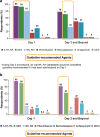Chemotherapy-induced nausea and vomiting (CINV) and adherence to antiemetic guidelines: results of a survey of oncology nurses
- PMID: 28871358
- PMCID: PMC5752733
- DOI: 10.1007/s00520-017-3866-6
Chemotherapy-induced nausea and vomiting (CINV) and adherence to antiemetic guidelines: results of a survey of oncology nurses
Abstract
Purpose: Chemotherapy-induced nausea and vomiting (CINV) can be prevented in most patients with use of guideline-recommended antiemetic regimens. However, studies have suggested that adherence to antiemetic guidelines is suboptimal. Oncology nurses, as part of a multidisciplinary team, can help promote appropriate antiemetic prophylaxis. Therefore, nurses were surveyed to assess antiemetic guideline awareness and practice patterns of antiemetic use, determine adherence to guideline recommendations, and query barriers to adherence.
Methods: In September 2015, 531 US-based oncology nurses participated in an online survey administered and analyzed by ONS:Edge.
Results: Nurses were most familiar with National Comprehensive Cancer Network (73%) and American Society of Clinical Oncology (48%) antiemetic guidelines. While most (77%) felt that antiemetics prescribed were consistent with guideline recommendations, practice patterns of antiemetic use revealed low adherence to those guidelines, particularly during the delayed (25-120 h) phase following highly emetogenic chemotherapy, where only 25% of nurses reported administration of guideline-recommended agents. Overutilization of phenothiazines and benzodiazepines was common. Only 17% of respondents reported that most (> 75%) of their patients have CINV optimally controlled; 39% reported between 6 and 20% of patients have an alteration in their chemotherapy due to CINV, and reports of emergency department/hospital visits due to poorly controlled CINV were high. The predominant barrier interfering guideline-recommended antiemetic prophylaxis was reported as physician preference (71%).
Conclusions: This survey revealed an opportunity to increase awareness of antiemetic guidelines and a critical need to address barriers interfering with utilization of guideline-recommended antiemetic agents in order to optimize CINV control for patients undergoing emetogenic chemotherapy.
Keywords: Adherence; Antiemetics; Chemotherapy-induced nausea and vomiting (CINV); Emesis; Guidelines.
Conflict of interest statement
The authors have the following conflicts of interest to disclose:
Figures




References
-
- ASCO 50th anniversary poll names top 5 advances past 50 years. The ASCO Post, October 15, 2014
-
- Roila F, Molassiotis A, Herrstedt J, et al. (2016) MASCC and ESMO guideline update for the prevention of chemotherapy- and radiotherapy-induced nausea and vomiting and of nausea and vomiting in advanced cancer patients. Ann Oncol 27:119–133 - PubMed
Publication types
MeSH terms
Substances
LinkOut - more resources
Full Text Sources
Other Literature Sources
Medical

